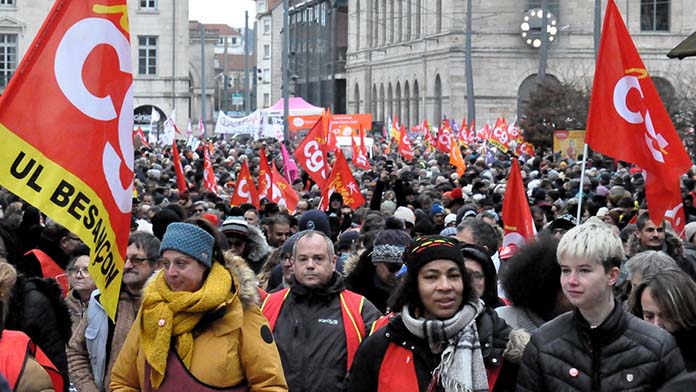Spontaneous protests exploded in cities across France in April after its constitutional court, stuffed with elite political and state figures, declared that President Emmanuel Macron’s pension attacks had been passed legally.
The protests raged against the undemocratic way Macron and his government has rammed through the measure.
There had been no vote in parliament. Instead Macron used part of the constitution that allows the law through unless the government is defeated in a no-confidence vote.
Speaking from a Paris protest, teacher Sophie said, “We knew this was coming, but it doesn’t stop our rage. The authorities banned this protest, but we are too angry not to come on the streets. We have to go on.”
The court did strike out six parts of the new pension law—most of them the meagre sweeteners MPs had added during debates on the law. But it waved through the two-year increase in the pension age. It also threw out a request filed by some of the left for a referendum.
That doesn’t mean the struggle is over. It does mean the union leaders’ strategy has failed.
The co-ordination of union leaders from across French union federations has now called on “all workers, young people, and retirees to make 1 May a day of exceptional and popular mobilisation against pension reform and for social justice”.
That’s very slow. The four main rail unions called for a “day of expression of railway anger” for 20 April. “We won’t move on until this law is scrapped,” said the unions’ press release.
Workers took to the streets that day for the 12th day of national action since January, showing the potential for further resistance.
The CGT union said that over a million joined protests including 400,000 in Paris, 130,000 in Marseille, 70,000 in Toulouse and 40,000 in Bordeaux.
Many people refuse to go back to “normality” or to “move on” and accept Macron’s assault. On the Paris demo, one section of civil service trade unionists repeatedly played Queen’s “Don’t stop me now” on their sound system as a reminder to Macron and their own leaders.
Significantly, thousands of university and school students raged on “unofficial” demonstrations in Paris and some other cities.
The day began with the inspiring news that Paris’s refuse workers were striking again—and occupying part of the Ivry incinerator site. Rail, health and education workers and strikers from other sectors briefly took over the premises of the LVMH luxury goods group owned by Bernard Arnault. He is France’s—and perhaps the world’s—richest man.
Chanting, “Here’s the money,” Sud Rail union activists let off smoke bombs and raised flags at the Louis Vuitton headquarters.
Union leaders
Some union leaders see 1 May as the last act of the resistance. The CFDT general secretary Laurent Berger has already said he wants to return to talks with the government once it has passed.
A new strategy based around building for an extended general strike is urgently needed. In February 2006 the government passed a measure known as the First Employment Contact (CPE in French). It argued that the way to increase the employment of younger people was to strip them of their rights.
Workers and young people struck and continued to protest against it even after MPs backed it. Eventually, in April—two months after the formal adoption of the law—the prime minister announced that “the conditions have not been met” for the CPE to apply.
In a bitter but defiant statement, the refinery workers of the CGT Total union set out why they were ending an indefinite strike that they launched on 7 March. “If the mobilisation is struggling today, it is not for lack of determination on the part of the base, which has been on strike for weeks,” it said.
“But because the union has refused to build a balance of power to match the ambitions of our enemies. Rather than calling for seven days of action since 7 March, they should have called for these days of strikes to be linked together to truly stop the economy, which would have changed the fate of the movement.
“We are among those who have never believed in the method of isolated action days.”
But they ended with a call for more resistance. “It is now clear to everyone that Macron’s regime is only held together by the police and repression. Under these conditions, he knows he is unable to get through the four long years that remain to him and even less to pass the rest of the counter-reforms he has in mind.
“What matters now, for all those who have fought and who continue to do so, is to know with what achievements we will return to the battlefield.”
An ongoing general strike for more than one day, and militant protests, could have smashed Macron by now. But union leaders have refused to call that kind of action.
It shows why a new revolutionary leadership among rank-and-file workers is needed to ensure struggle ends in victory.
By Charlie Kimber






